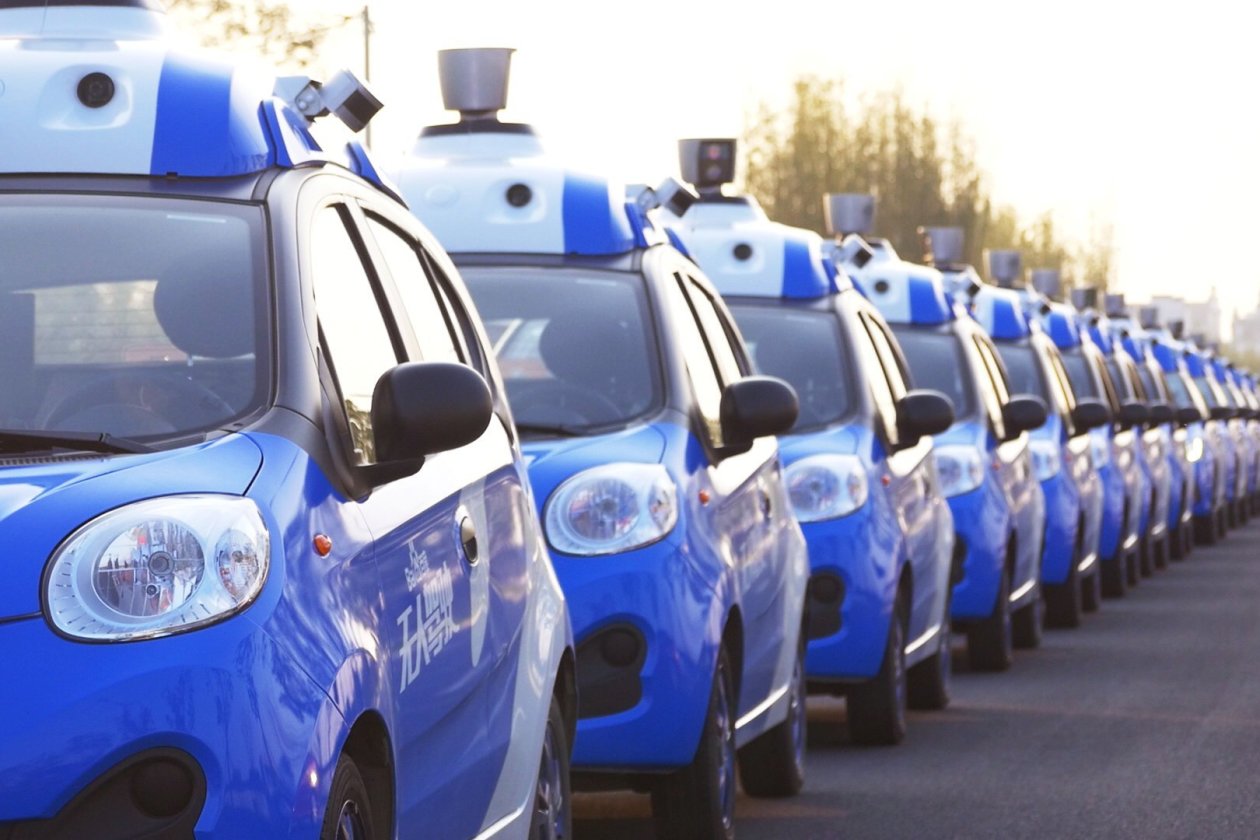24 Mar Don’t Call It a Car: China’s Internet Giants Want to Sell You ‘Mobile Living Spaces’
The Wall Street Journal, March 18, 2018
Baidu, Alibaba and Tencent are betting the auto industry will shift from selling hardware to selling subscriptions to internet-equipped autonomous cars

Baidu, Alibaba and Tencent are colonizing an auto industry increasingly reliant on artificial intelligence, software and mobile internet. A fleet of vehicles equipped with Baidu’s autonomous driving technologies in Wuzhen, China. PHOTO: BAIDU HANDOUT/REUTERS
SHANGHAI—Chinese technology giants Baidu Inc., Alibaba Group Holding Ltd. and Tencent Holdings Ltd.—dominant forces in e-commerce, mobile payments and social media—now are elbowing their way into autos, threatening established car makers.
These three companies—the so-called BATs—are plowing millions of dollars into electric-vehicle startups, car-sharing services and online retailers, as well as software platforms for autonomous driving and online car selling.
U.S. tech companies, notably Alphabet Inc. and its self-driving car unit Waymo, also are pushing into the auto sector. But the BAT companies have a big advantage in China, where tight government internet controls make it difficult for foreign enterprises to compete. For example, non-Chinese companies aren’t allowed to operate digital mapping systems needed for autonomous driving.
BAT-Mobiles
Chinese tech giants Baidu, Alibaba and Tencent have become major players in the auto business. Their interests span from electric-vehicle startups to smartcar software and online retail channels.
That has prompted both foreign and domestic auto companies like Ford Motor Co. , BMW AG , SAIC Motor Corp. and Zhejiang Geely Holding Group Co. to seal tech partnerships with the BAT firms. This month, Renault SA said it is aiming for a fivefold increase in Chinese sales by 2023 as the result of a deal to sell cars on Alibaba’s online retail platforms. Renault also said it would start using Alibaba’s connectivity software in its cars in China.
The threat posed by China’s internet giants was underscored when Li Shufu, the founder of Zhejiang Geely, announced last month that the company would invest $9 billion in a 9.7% stake in Mercedes-Benz parent Daimler AG
“The competitors that challenge the global car industry in the 21st century technologically are not part of the automotive industry today,” Mr. Li said in a statement. “No current car industry player will be able to win this battle against the invaders from outside independently.”
Baidu, Alibaba and Tencent are betting that the auto industry is going to shift from selling hardware to selling services, with revenues derived mainly from selling subscriptions to features like shared autonomous vehicles and high-speed mobile internet.
“The BATs want people in cars using their online services. They see mobility as an on-ramp into their ecosystems,” said Bill Russo, an ex-Chrysler executive who now runs Shanghai consultancy Automobility. “So they’re all actively investing in mobility… This is a game that’s not happening anywhere else. It’s what makes China so unique.”
Baidu Chief Executive Robin Li has made developing self-driving cars a priority for the search and mapping company. “In future commutes, you won’t have to focus much on driving anymore,” he said, on the sidelines of China’s annual legislative session in Beijing this week. “You’ll be able to have hot pot and sing karaoke on the ride.”
Chen Hong, chairman of SAIC Motor, China’s biggest car maker, speaking separately at the legislative session, acknowledged the tech giants’ threat but said traditional auto makers have an edge in understanding drivers and their needs.
Still, these auto makers need partners. SAIC has launched an internet-connected car powered by AliOS, Alibaba’s in-car operating system. Two big state-run car makers, Beijing Auto and Guangzhou Auto, are developing similar so-called smartcars with Baidu and Tencent respectively. Last year, Ford and BMW both said they, too, would launch smartcars using Alibaba’s software.
The BATs are also generously bankrolling startups that are making smartcars slated to hit the China market later this year.
Alibaba-backed startup Xpeng Motor’s new G3 SUV comes loaded with maps, music apps, Mandarin voice recognition and even a camera mounted on the roof, for buyers looking to post their travels on social media. Alibaba’s technology and its knowledge of the consumer, accrued over nearly two decades as China’s biggest e-commerce player, is helping Xpeng develop and grow quickly, said founder Xiaopeng He.
Traditional car makers need the BATs’ strategic insights in a fast-changing marketplace, said Freeman Shen, whose electric-vehicle startup WM Motor is backed by Baidu and Tencent. Unless auto makers work with the BATs, said Mr. Shen, a former Geely executive, “I don’t think they can survive.”
Baidu and Tencent are also investors in Shanghai-based NIO, whose debut electric vehicle has a voice-operated personal assistant, is able to park itself and comes loaded with apps provided by its two big tech backers.
The automobile is turning into a “mobile living space,” said NIO founder William Li. The passenger is a captive audience for internet services—hence the BATs’ interest in autos as potential channels for everything from online shopping to videogames to mobile TV.
All three companies have also invested in Didi Chuxing, China’s answer to Uber. And Tencent, hedging its bets beyond China, last year bought 5% of Tesla Inc . for $1.78 billion.
For now, auto makers and tech companies can coexist by marrying car-making expertise with software innovation. “When you put these two together you get a fantastic chemical reaction,” said Simon Hu, who runs Alibaba’s AliOS car operating-system division.
But as China’s tech giants permeate the auto industry from all angles, the big question is: How much of the sector’s revenues will they manage to commandeer? “The BATs have the bucks required to get into this game and stay in the game for however long it takes to win,” said Michael Dunne, a Hong Kong-based auto consultant.
—Yoko Kubota in Beijing contributed to this article.



Sorry, the comment form is closed at this time.